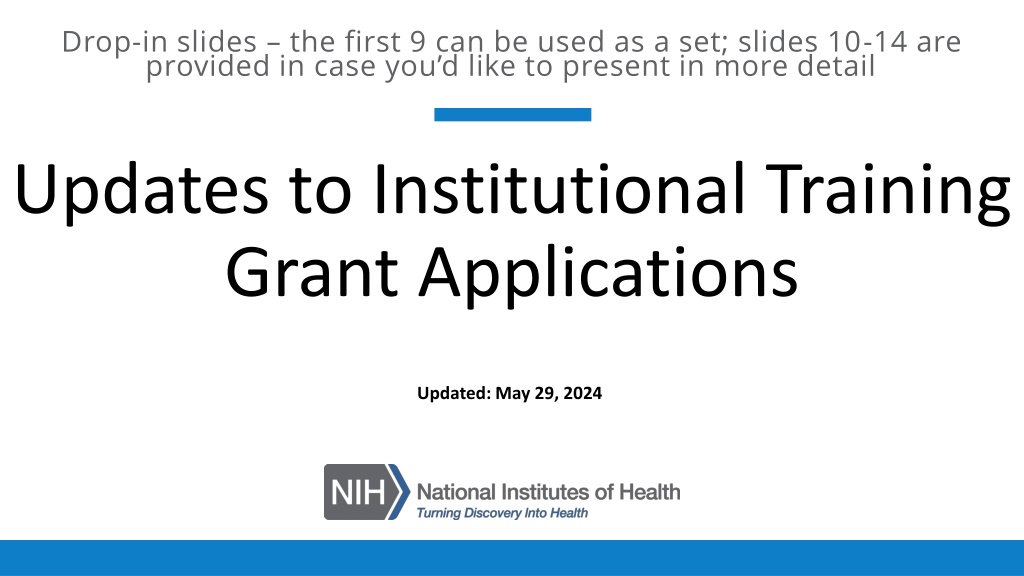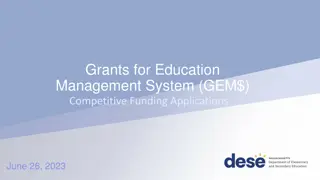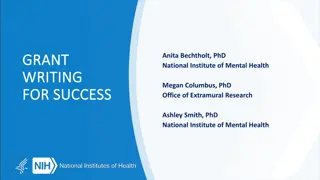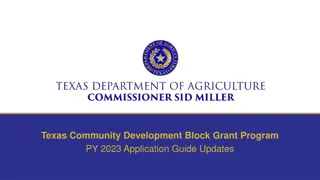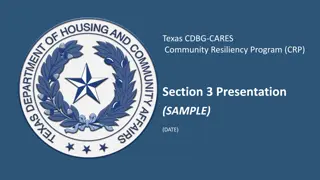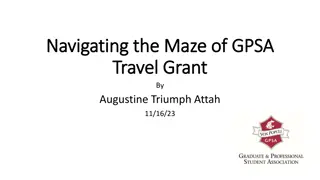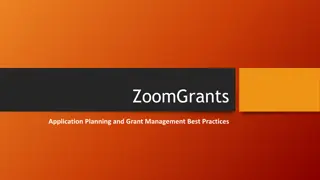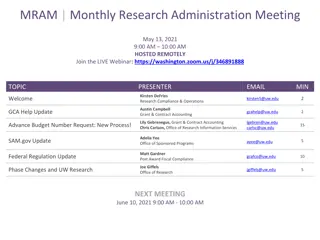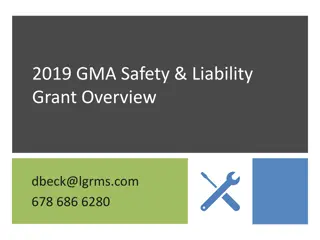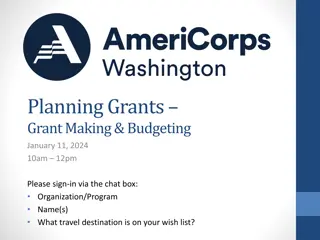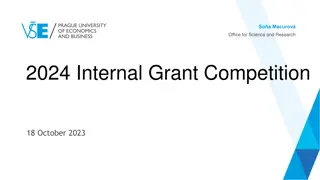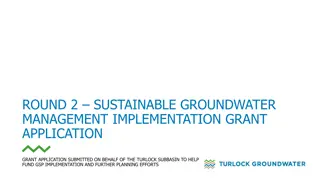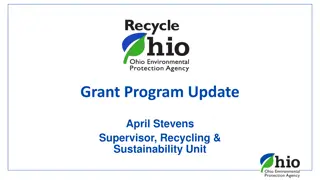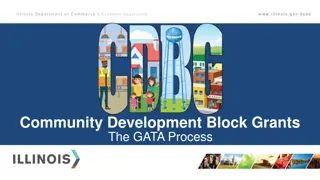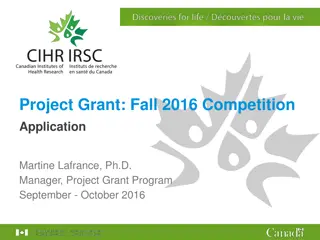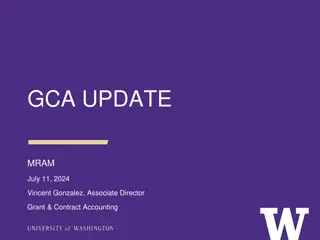Updates to Institutional Training Grant Applications - May 29, 2024
Changes are coming to Institutional Training Grant Applications to reduce burden and support a diverse biomedical research workforce. Updates include key changes to application forms, mentor training expectations, data tables, and peer review criteria. Learn more about the aims and scope of these changes to be implemented after January 25, 2025.
Download Presentation

Please find below an Image/Link to download the presentation.
The content on the website is provided AS IS for your information and personal use only. It may not be sold, licensed, or shared on other websites without obtaining consent from the author. Download presentation by click this link. If you encounter any issues during the download, it is possible that the publisher has removed the file from their server.
E N D
Presentation Transcript
Drop-in slides the first 9 can be used as a set; slides 10-14 are provided in case you d like to present in more detail Updates to Institutional Training Grant Applications Updated: May 29, 2024
USE THESE SLIDES IF YOU WANT TO COVER THE TOPIC BRIEFLY
Changes Coming: Updates to Institutional Training Grant Applications Aims: Reduce applicant and reviewer burden. Further support the development of a biomedical research workforce that will benefit from the full range ofperspectives, experiencesandbackgrounds needed to advance discovery. Scope: Applies to applications submitted for due dates after January 25, 2025, using the following activity codes: Institutional Training T series, e.g., T15, T32, T34, T35, T37, T90/R90, TL1, TL4 International Institutional Training D43, D71, U2R Institutional Career Development KL2, K12 Guide Notice NOT-OD-24-129 3
Why are Changes Being Made? Over the past decade, NIH has made significant investments to develop, implement, assess and disseminate innovative, effective approaches to research training and mentoring and to prepare trainees for a variety of career paths in the biomedical research workforce. The updates are driven by: A need for evidence-informed mentoring practices that promote the development of trainees from all backgrounds. The need to support trainees pursuing the full breadth of scientific career paths to advance the NIH mission. The desire to reduce training grant applicant and reviewer burden. 4
Overview of the Updates Key application changes: PHS 398 Research Training Program Plan Form - Recruitment Plan to Enhance Diversity will be its own attachment. Parent T32 Notice of Funding Opportunity (NOFO) Define mentor training expectations. Update NRSA Data Tables to reduce burden and promote consistent information collection across training programs. Key changes to peer review: Move Responsible Conduct of Research and Recruitment Plan to Enhance Diversity to Additional Review Considerations so they contribute to the overall impact score. 5
Application Updates PHS 398 Research Training Program Updated Form Updated form The Recruitment Plan to Enhance Diversity will be made its own attachment on the PHS 398 Research Training Program Form 2. Program Plan (25-Page Limit) Background Program Plan 3. Recruitment Plan to Enhance Diversity (3-page limit) 4. Plan for Instruction in the Responsible Conduct of Research 5. Plan for Instruction in Methods for Enhancing Reproducibility 6. Multiple PD/PI Leadership Plan (if applicable) 7. Progress Report (for Renewal applications) 6
Funding Opportunity Updates Mentor Training Expectations and Career Outcomes Parent T32s will include language to better define and support expectations for mentor training Addressed in the program considerations, program plan, and review criteria Potential mentor training topics include: Aligning expectations Maintaining effective communication Fostering independence Assessing scholars' understanding of scientific research Enhancing professional development Addressing equity and inclusion Articulating mentoring philosophy and plan Programs should adapt mentor training topics to suit program and trainee needs. 7
Peer Review Updates Training grants will retain the five scored review criteria currently used in review. Training Program and Environment Training Program Director(s)/Principal Investigator(s) Preceptors/Mentors Trainees Training Record Training and the Responsible Conduct of Research and Recruitment Plan to Enhance Diversity will be moved to Additional Review Criteria Will now contribute to the overall impact score Previously post-score considerations 8
Data Table Updates General and Program-Specific Updates Changes are intended to reduce burden and promote consistency in the requested information For all data tables Updated table instructions to clarify terms and lettering for training stage Remove redundancies by not asking for structured data available elsewhere in the application Multiple changes specific to predoctoral, postdoctoral, undergraduate, and international training tables, including: Update Table 1 - applicants will only be required to provide information relevant to the training stage(s) in the proposed program. Realign table 5 - focus on the outcomes only on trainees supported by the grant. Table 6 - remove some trainee characteristics. Table 8 - remove Part II. Those Clearly Associated with the Training Grant & encourage reporting this information in the Program Plan Section or RPPR narrative. 9
NIH Grants Page on Updates to Institutional Training Grant Applications Background Overview of changes Notices, reports, and blogs Training, resources, and FAQs Contact information Link: grants.nih.gov/policy/changes-coming- jan-2025/updates-to-training-grants.htm 10
Wondering about the implications for your application preparation? Consider participating in this live, virtual event where NIH experts will provide insights and updates on these changes, concluding with a live Q&A session June 5, 2024 from 1:00 2:00 pm ET Register at grants.nih.gov/learning-center/nih-training-grant- application-updates-webinar 11
Strengthening the Biomedical Research Workforce (1) UNITE - NIH-wide initiative to identify and address any structural barriers identify and address any structural barriers that may exist within the NIH and throughout the biomedical and behavioral workforce. UNITE E Focus Area UNITE E Focus Area: Promoting equity in the NIH-supported biomedical research ecosystem. Recommendation: Recommendation: o Incorporate additional language to strengthen mentoring and promote workforce diversity in parent T series NOFOs. o Builds upon other NIH-wide efforts to strengthen the workforce (including Diversity Program Consortium, BEST Program, ACD Working Group on Postdoctoral Training) 13
Data Table Updates Changes Impacting all Applications Overall, updates to reduce burden and promote consistency in requested information. Table 1 (Census of Participating Department or Interdepartmental Programs) o Currently, T32 applicants provide information on predoctorates and postdoctorates, regardless of the training stage of the proposed program. o Planned update: Applicants will be required to provide data only relevant to the training stage(s) in the proposed program. Undergraduate training programs (T34) will include this table. Table 8: Program Outcomes o Currently, asks T32 grantees to include Clearly associated trainees. o Planned Update: Remove Part II. Those Clearly Associated with the Training Grant encourage to report in Program Plan Section or RPPR narrative. 14
Data Table Updates Table 5 Publications of Those in Training Currently oriented around the training faculty as opposed to trainee outcomes. Planned updates o Re-align table to focus on outcomes for trainees supported by the grant. o Allow inclusion of interim research products (such as preprints) only when final publication not available. Similar to what happens for R, F, and K applications. o Undergraduate: Can include external, published conference abstracts. 15
Data Table Updates Table 5 Example List trainees first (followed by PI); trainees will match those listed on Table 8 (up to 10 years) Add pre-print example Options o Add co-mentor o Can denote former trainers (*) 16
Data Table Updates Table 6 - Applicants, Entrants, and their Characteristics for the Past Five Years Currently, T32 applicants collect detailed trainee characteristics on anyone who applied to and entered the training program. Predoc: Mean months of prior research experience, prior institution, and GPA. Postdoc: Mean number of publications (total and first author), prior institutions. Counters NOFO instructions for multifactorial candidate review process. Program admissions is the applicant s responsibility NIH wants to focus on post- appointment outcomes. Planned update: Remove above referenced trainee characteristics. 17
